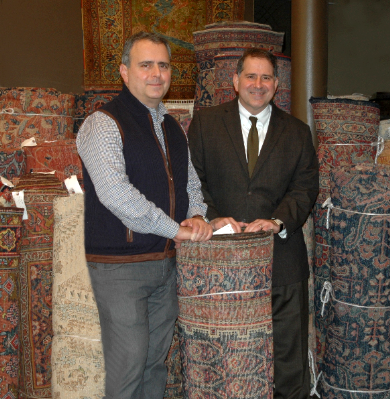 Brothers Oscar and Sark Tatosian are celebrating the 95th anniversary of Oscar Isberian Rugs. Founded in Evanston, IL in 1920, the company has grown significantly since they took the helm.
Brothers Oscar and Sark Tatosian are celebrating the 95th anniversary of Oscar Isberian Rugs. Founded in Evanston, IL in 1920, the company has grown significantly since they took the helm.
Back to the Future
Brothers Oscar and Megerditch Isberian, like many others, fled to America to escape the Armenian Genocide in the Ottoman Empire (the atrocities started in 1915 and ended in the early 1920s). A great-uncle, already in the U.S. and an auction house specialist, encouraged the young entrepreneurs to start their rug business.
"In the beginning, I think the Isberians relied on U.S. importers, and maybe house sales and auctions, to collect an inventory," relates Oscar Tatosian. "I think there was a structure of importers in New York, names like Karagheusian and Avakian. I can only imagine that like any new business, it was difficult to start out, and the US importers probably supported them with payment options like consignment."
Today, Isberian Rugs does a lot of direct import as well, having built strong face-to face relationships with weavers in India, Pakistan and Nepal. But the founders zeroed in on Iran for direct imports.
Sark and Oscar believe that Oscar Isberian's cleaning/repair business was built to provide steady income when sales were slow or stagnant, but over the years many cleaning/repair customers became Isberian rug buyers.
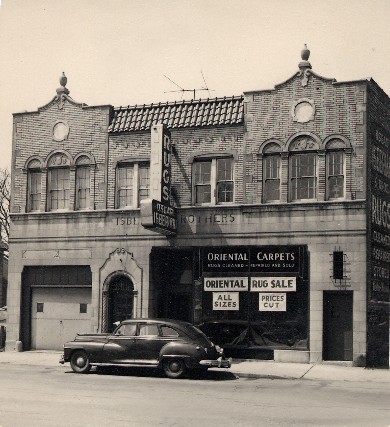
Then and now: An heirloom photo from the 1940s shows the first Isberian store in suburban Evanston, IL, which still retains the character of its c. 1920 exterior architecture and warehouse-style interior today (below).
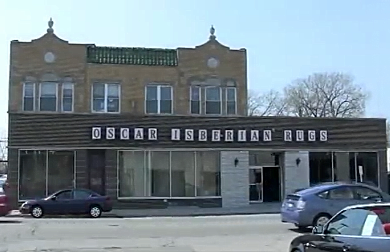
In the late '20s, Oscar Isberian became sole owner of the business. He had two daughters: one married Haig Pedian (who owned a rug business with his two brothers), and Isberian's other daughter married Mardiros Tatosian, a structural engineer. Their sons Sarkis and Oscar eventually began to work with granddad.
"We learned directly from our grandfather, with no intervening generation, so we were fairly free to re-invent and create our own stamp on the business," says Sark. "We had a unique and special relationship."
In 1980, when Oscar Isberian's long-time manager moved away, Oscar was in his 80s and he needed successors to run the business.
"My brother and I were in college at the time, studying and having a good time," laughs Sark. "When grandpa said, 'I can't run this myself. If you guys want to come into the business, you need to do it now,' I had two years under my belt at Marquette, and Oscar had one year under his belt at Texas Christian University (TCU). We didn't want to give up our college years, so we came up a unique work-study program: One semester I would work and Oscar would go to school; the next semester, we would swap. We also took classes locally."
Sark still graduated in four years, and Oscar graduated in five. Degrees in hand, they took over Isberian Rugs in 1980.
Changes in People and Product
"The business was coasting along, so when we came in, it was fresh blood," says Sark. "And we were lucky to get in at a time when area rugs and Oriental rugs were getting more and more popular."
Industry-wide though, high-end rugs are still a small part of overall sales, compared to carpeting and machine woven, notes Sark. "It's higher end than it was, but it's still a boutique, niche business."
Both product and people have changed a great deal since Oscar Isberian's time, say the brothers. "When we started out, customers were very knowledgeable about Oriental rugs," says Sark. "Today, they're primarily interested in color and pattern."
Oscar agrees. "Years ago I think people appreciated understanding the quality of the carpet and the history of the carpet; now it is mostly color and design that they appreciate in a carpet," he says. "And I think the level of expertise has diminished; I don't think the merchants themselves have the expertise. The whole romance of it has become like fast food and away from fine French cuisine. I don't know that the change has been for the better, frankly," he adds.
Sark sees it a bit differently: "Well, I kind of welcome the influx of new contemporary designs and textures. To me, it's been like a renaissance. I like the fact that we don't have to sell the similar, same products. I think the weavers are extremely creative all over the world, from India, Nepal and Pakistan in particular. And I like the challenge of trying to find that right product."
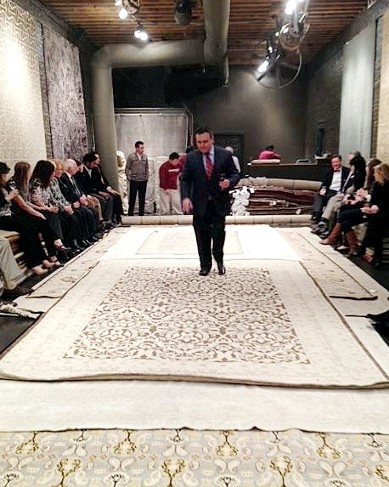 At a special event for customers, Oscar Isberian Rugs' co-owner Oscar Tatosian shows off some the new transitional designs and colors in rugs that had just arrived.
At a special event for customers, Oscar Isberian Rugs' co-owner Oscar Tatosian shows off some the new transitional designs and colors in rugs that had just arrived. Today, the Tatosians enjoy developing the product, too, working closely with their weavers in India, Pakistan and Nepal on colorways, textures, and designs.
"That keeps it fresh for us," says Sarkis.
While Isberian does a lot of direct import these days, more than half of their purchases are handmade, predominately wool rugs from U.S.-based suppliers such as Tamarian, Wool and Silk, Marjan, Megerian, Due Process and Amici. Isberian's average sale today is a 9' x 12' retailing between $5,000 and $10,000.
Integrity is Key
Trust and honor are key to Isberian's success, according to the brothers. "I think Isberian has a trusted name," says Sark, "because we sell the best possible rugs at fair prices every time, and we stand behind the product. Since we began this business, I can count on one hand the number of customers that weren't happy, and couldn't be satisfied."
"One thing that's most important for our business is when you give your word to the vendor or your customer, you make every effort to honor your word," Oscar adds.
Isberian History Highlights
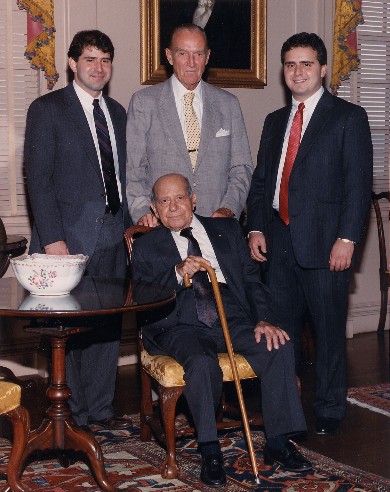
In the mid-1980s, Oscar Isberian Rugs presented a carpet to the U.S. State Department. Oscar Isberian is seated, and Sarkis and Oscar Tatosian flank Clement Conger, curator of the State Department's Reception Rooms and of the White House.
When Oscar Isberian was 90, the company donated some rugs to the U.S. State Department, so Sark and Oscar took their grandfather to Washington, D.C. to make the presentation.
"As an immigrant, he wanted to give something back so he donated beautiful rugs to the State Department," relates Oscar.
"Another time, with the help of the Indian government we brought four weavers and a 9' x12' loom from India and set it up in our showroom to show customers how their rugs were made, how much time it took," adds Oscar.
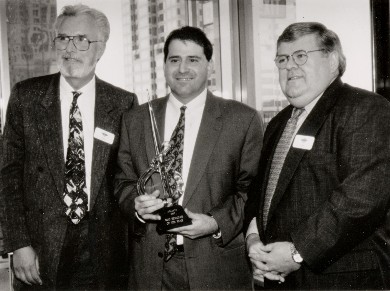
Flanked by AmericasMart executives Chas Sydney and Jack Ryan, Sarkis Tatosian accepts the 1997 Retailer of the Year Award for Oscar Isberian Rugs. The ROY awards were co-sponsored by the Oriental Rug Retailers of America and AmericasMart Atlanta.
And very recently, the winning rugs in Isberian's student rug design competition--held in conjunction with Chicago's Harrington School of Design--caught the eye of the Chicago mayor Rahm Emanuel.
"We usually make up 10 of the winning designs, which are auctioned off for scholarships," says Sark. "One of the winners caught the eye of the mayor who was redecorating his office. He wanted everything to have a Chicago connection, and they were having trouble finding floor covering with a Chicago connection.
"Lo and behold, I get a call on my cell phone, and it's Rahm Emanuel," says Sark, "and Emanuel says there is one rug design he would like for his office." The Harrington School of Design was the Chicago link, and the rug, gifted by the Tatosians, now graces the mayor's office.
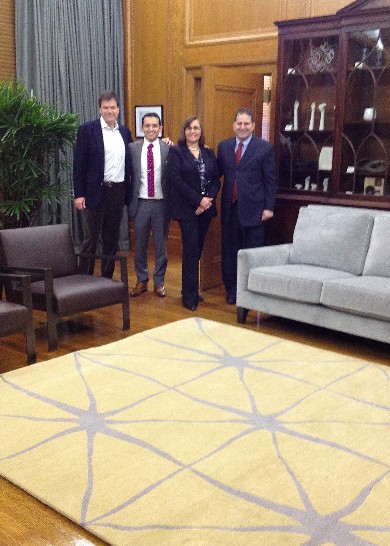
Standing behind the Starlight wool rug which was selected by Chicago Mayor Rahm Emanuel for his office from winning designs are Tom O'Bryant of the mayor's design team, Dan Cornejo of Isberian Rugs, the rug's designer Susan Sissman, and Sarkis Tatosian.